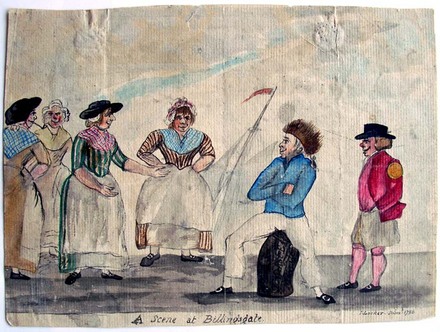Billingsgate was an enormous fish market in eighteenth and nineteenth-century London, and a slang term for coarsely abusive or profane language. The artist of this sketch was John Locker (1773-1834), chief magistrate and registrar of the Vice Admiralty Court at Malta. As the son of Captain William Locker (1731-1800), Lieutenant-Governor of Greenwich Hospital and a great patron to the arts, John was introduced to many painters while growing up, including Gilbert Stewart (1755-1828), who painted Captain Locker’s portrait shortly before he died.
Both John and his brother Edward Hawke Locker (1777-1849) were educated at Eton College and received training in the visual arts before pursuing naval careers. Edward was the only one to publish his art. In 1813, during the Peninsular War, he traveled to Spain with Lord John Russell and later published a memoir entitled Views of Spain (1824), with illustrations after his own watercolors (Ex 1521.592).
Captain Locker planned a gallery of naval art but it fell to Edward, who became an administrator at Greenwich Hospital, to finally establish a National Maritime Museum. His son, John’s nephew, was Frederick Locker-Lampson (1821-1895), a minor poet and major bibliophile. In Frederick’s book My Confidences. An Autobiographical Sketch Addressed to My Descendants, he wrote, “The Lockers were a homely-looking race.”
“…Uncle John Locker, who was very ugly, used to say that you could not widen the mouth of a Locker without injury to his ears. One day at Malta, at the dinner table, he asked a stranger, who had just landed, to take wine, expressing his pleasure in seeing him there and his obligation in these words: ‘Yesterday, sir, I was the ugliest man in all Malta!’ Tradition says that the man did not resent this speech, so I presume my uncle, with all his impudence, had some social tact.”
